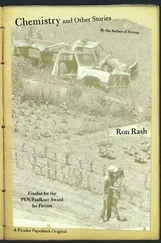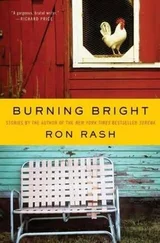Pemberton continued to stare at Jacob. It was impossible not to. The dark-brown eyes solemnly stared back at him. The Harmon girl noticed and turned the boy away. For a few moments no one moved, as if all awaited someone else to enter the office and set something yet unknown into motion. The only sound was the tick of the brass chain against the ceiling fan's motor.
McDowell opened the desk drawer and pulled out his revolver. The sheriff clicked off the safety and pointed it at Pemberton.
"Get out of here."
Pemberton was about to speak, but McDowell thumbed back the hammer and aimed directly at Pemberton's forehead. The sheriff's raised arm and hand did not tremble as the index finger settled against the trigger.
"If you say a word, one single word, I swear to God I'll kill you," McDowell said.
Pemberton believed him. He stepped away from the desk and walked across the room, the Harmon girl clutching the child tighter in her arms as if Pemberton might try to snatch away the boy. Pemberton opened the door and stepped blinking into the midday light.
The town was still there, the streetlamps and shops and the not quite obsolete hitching post, the clock face on the courthouse steeple. Pemberton watched as the ponderous minute hand lurched forward and nudged away another bit of time. He recalled one of the few occasions he'd attended his physics class at Harvard, the professor lecturing on an idea espoused by an Austrian scientist about the relativity of time. It seemed that way to him now, as if time was no longer brisk measured increments but something more fluid, with its own currents and eddies. Something that could easily sweep him away.
A Model T blared its horn and pulled around him. Only then did Pemberton realize he stood in the middle of the street. Pemberton walked to his car and got in, but he did not turn the key and press the starter button.
In a few minutes the office door opened. The older woman went up the street, but the girl and child got in the sheriff's car. Pemberton let them get far enough away and then pulled out and followed the sheriff's car west. After a while the blacktop became dirt, and gray roostertails of dust rose in the police car's wake. Pemberton dropped farther behind, no longer following the car but the haze of dust. The dust trail soon left the main road, turned down the washout that led to Deep Creek. Pemberton knew where they were headed.
Pemberton did not follow but drove fifty yards past. He turned the Packard around and parked it on the road's weedy shoulder. The day was warm, but he didn't roll down the passenger window. He wanted to blame the heat for the sweat matting his shirt. Twenty minutes later the sheriff's car came back up the secondary road and turned toward Waynesville.
There was a two-foot-long Stillson wrench in the trunk, and for a few minutes he imagined the ten pounds of iron in his grasp. It would be enough. Or he could simply make a phone call to Meeks, a few words passed on to Galloway. He turned the key and his foot pressed the starter button. Pemberton let his hand settle over the black gear shift knob. He squeezed and felt the ball of hard rubber in his grip. He pressed the clutch and paused a moment longer, then shifted the Packard into gear. When he came to the Deep Creek turnoff, Pemberton did not slow but kept on going. He drove into Waynesville, on past the hospital and elementary school and the train depot, then on toward Cove Creek Valley.
As Pemberton passed the saw mill, he remembered his father's funeral, though "remembered" didn't seem as apt a word to him as "recovered." He could not recall the last time he'd thought of the funeral since his return from Boston. Or when he'd last thought of his mother or two sisters. The letters they'd written him those first months had been thrown away unopened. Partly it had been his freeing himself of the past, as Serena advocated, but it had also been a self-willed amnesia, a spell willingly succumbed to.
Pemberton was halfway to the camp when he pulled off at the summit where he'd first shown Serena the lumber company's holdings. He stepped to the precipice and looked down at the vast dark gash they'd made on the land. Pemberton stared at the razed landscape a long time, wanting it to be enough. He looked beyond the valley and ridges and found Mount Mitchell. The highest point in the eastern United States, Buchanan had claimed, and so it appeared to be, its tip closer to the clouds than any other in sight. Pemberton gazed at the peak a long time, then let his eyes fall slowly downward, and it was as if he was falling as well, falling slow and deliberate and with his eyes open.
BEFORE SHE SAW THE LATE MORNING LIGHT, Rachel had felt it, the sun's heat and brightness lying full on her closed eyelids. She heard Jacob's steady breaths and something, something not remembered in those first moments of waking, caused her to know the importance of his breaths, that he was breathing. She reached her arms around the child, pressed him closer. He made a soft complaint, but his breath soon soothed into the calmness of sleep. It all came back to her then-the sheriff at the cabin door, a dress and shoes quickly pulled on and a carpetbag stuffed with what Jacob would need. Maybe nothing, just a rusty, the sheriff had told her, but he didn't want to take a chance. He'd brought her to the boarding house, given her and Jacob his own room for the night. Rachel had listened to the grandfather clock in the hallway chime the hours toward dawn, unable to sleep until first light filtered through the window and Jacob had whimpered and she'd suckled him. Only then did she fall asleep.
Now, in the early afternoon, she and Jacob were in the back seat of Sheriff McDowell's police car, heading down what was little more than a skid trail along Deep Creek. They made another turn, the road now nothing more than a winding gap between trees. Sapling branches raked the car's sides, the seat springs creaking and bobbing beneath her and Jacob. The road made a sharp final bend and then was simply gone. Nothing but a stand of maple trees, a foot-wide path leading into them. The sheriff backed up and turned the car around to face the way they'd come. He cut off the engine but did not make a move to get out. Rachel had no idea where they were. When she'd asked the sheriff where they were going, the only words she'd spoken since his landlady had brought her and Jacob to the courthouse, he'd just answered somewhere safe. The sheriff looked in the rearview mirror, met her eyes.
"You'll be staying down here a few hours with a man named Kephart. You can trust him."
"It could have been just a rusty somebody was playing, couldn't it, like you said?"
The sheriff turned and placed his arm on the seat.
"Adeline Jenkins was murdered last night. I think the folks who killed her thought she could tell them where you and that child were."
The car's metal and cloth upholstery seemed to thin and lighten, the seat beneath her and Jacob seeping away, a sense of weightlessness like the moment between the rise and fall on a rope swing. She pressed Jacob tighter, closed her eyes for a few moments, opened them.
"You mean the Widow?" Rachel said, saying it that way because if it was a question it could still, for a few moments longer, be a question and not a confirmation.
"Yes," McDowell said.
"Who would do such a thing?"
"Serena Pemberton and a man who works for her named Galloway. You know who he is, don't you?"
"Yes sir."
Jacob squirmed in her lap. Rachel looked down and saw his eyes were open.
"Mr. Pemberton…," Rachel said, and could think of no more words to follow.
"He wasn't up there, I know that," the sheriff said. "I'm not even sure he knew what they were going to do."
McDowell let his gaze settle on Jacob.
Читать дальше












